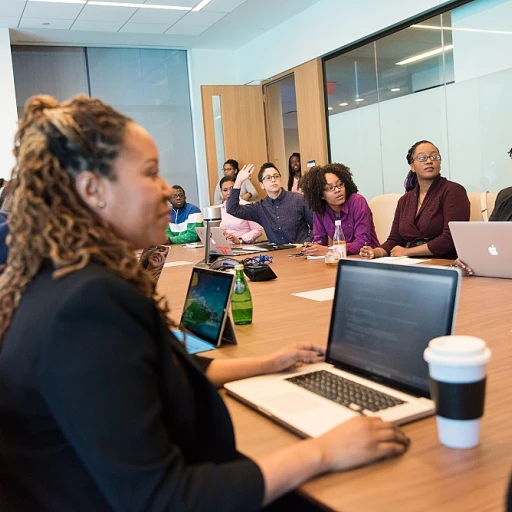Understanding DEI in Recruitment
Recognizing DEI Principles in Recruitment
Understanding the essence of Diversity, Equity, and Inclusion (DEI) in recruitment is integral for organizations aiming to cultivate a positive candidate experience. DEI initiatives are oriented towards ensuring that every candidate has equal access and opportunity throughout the hiring process. This not only enhances the recruitment experience but also aligns with the broader organizational commitment to diversity and inclusive culture. Most companies are aware of the importance of building diverse teams. However, the implementation of DEI initiatives needs to be deeply woven into the recruitment framework. This includes examining hiring practices, fostering an inclusive company culture, and addressing unconscious bias throughout the interview process. DEI is not merely a box-ticking exercise, but a concerted effort to ensure that candidates from varied backgrounds feel valued and welcomed. It redefines employer branding by portraying the organization as a positive, inclusive workplace that champions equity. Incorporating DEI principles can directly influence employer brand and, subsequently, attract top talent to the organization. Job seekers are increasingly considering company culture and values when making career decisions, making DEI an essential component of the recruitment process. One approach is to integrate DEI criteria into job descriptions and recruitment advertisements. Additionally, setting up diverse hiring panels ensures that varied perspectives are considered, thus reducing bias. Asking open-ended and inclusive questions during interviews can further promote a fair evaluation of candidates. For those interested in leveraging analytics to bolster these initiatives, harnessing HR analytics to enhance recruitment strategies provides valuable insights on how data can drive DEI efforts in recruitment. The proactive application of data analytics allows organizations to continuously assess and refine their DEI strategies, ensuring that the recruitment process remains inclusive and unbiased.Analyzing Candidate Experience Through Data
Leveraging Data to Improve Candidate Interactions
In the pursuit of diversity, equity, and inclusion (DEI) in recruitment, analyzing candidate experience through data is crucial. Data-driven insights can illuminate how candidates perceive the hiring process and where improvements are needed. This approach not only enhances the candidate experience but also strengthens the organization's ability to attract top talent.
To begin with, collecting data on various touchpoints in the recruitment process can help identify patterns and trends. For instance, tracking metrics such as time-to-hire, candidate drop-off rates, and feedback from job seekers can provide a comprehensive view of the recruitment landscape. These metrics can uncover potential barriers in the hiring process that may deter diverse candidates.
Utilizing Feedback for Continuous Improvement
Feedback from candidates is an invaluable resource for refining the recruitment process. Surveys and interviews can be used to gather insights on candidates' experiences, revealing areas where the process may fall short in terms of inclusivity and fairness. By analyzing this feedback, organizations can pinpoint specific stages in the hiring process that require attention.
Moreover, understanding how candidates interact with the company's employer brand and social media presence can offer clues about the effectiveness of DEI efforts. A positive candidate experience often correlates with a strong employer brand, which is essential for attracting diverse talent.
Data-Driven Decision Making
Implementing a data-driven approach to recruitment can also help mitigate unconscious bias in hiring practices. By relying on objective data rather than subjective judgments, companies can make more equitable hiring decisions. This approach supports the creation of diverse teams and fosters an inclusive workplace culture.
For those interested in delving deeper into how data can enhance recruitment strategies, consider exploring how data analytics can transform hiring practices. By leveraging data effectively, organizations can ensure that their DEI initiatives are not only well-intentioned but also impactful and sustainable.
Identifying Barriers to DEI in Hiring
Recognizing Challenges to Diversity, Equity, and Inclusion
Identifying barriers to a truly diverse and inclusive hiring process is crucial for organizations aiming to foster a positive candidate experience. Despite significant efforts, several challenges persist in achieving diversity, equity, and inclusion (DEI) within recruitment.
One key challenge is unconscious bias in hiring practices. These biases can inadvertently influence decision-making, often favoring candidates who mirror the current workplace culture. To address this, employers need to implement objective-based hiring methods to mitigate bias.
Examining the Recruitment Process
The recruitment process itself can present obstacles to DEI. Companies may inadvertently create barriers through non-inclusive job descriptions, limited outreach, and inflexible interview processes. Ensuring your recruitment process is accessible and inclusive helps in attracting top talent from diverse backgrounds. Consider assessing your internal sources of recruitment for improvements.
Analyzing Organizational Culture
An organization's culture plays a significant role in facilitating or hindering DEI. A non-inclusive culture can deter diverse candidates and affect the overall candidate experience. Creating an environment that values diversity and fosters inclusion is essential. Cultivating diverse teams can enhance the organization's employer brand and attract job seekers who value diversity inclusion.
Effective Communication and Transparency
Clear and open communication during the hiring process also impacts whether candidates feel valued and respected. Candidates appreciate transparency in company culture, DEI efforts, and potential career growth. Providing detailed information about the hiring process and answering questions genuinely improves perception and candidate engagement.
In conclusion, recognizing these barriers and taking proactive steps to overcome them will not only enhance the candidate experience but also contribute positively to the company's overall performance and culture. Ensuring your recruitment process is free from barriers is a pivotal step towards true diversity equity and inclusion.
Implementing DEI Strategies in Recruitment
Crafting a Holistic Approach to DEI in Recruitment
To truly enhance the candidate experience, companies must incorporate DEI initiatives thoughtfully into every aspect of the hiring process. Implementing effective DEI strategies requires not just intention, but structured action plans that address both immediate needs and long-term goals of fostering diversity, equity, and inclusion. One crucial approach is embedding DEI in the core of recruitment and selection processes. This starts with crafting job descriptions consciously to attract a diverse pool of talent. Keywords and language used can significantly influence who applies. Ensuring these listings promote inclusion can help reach a wider audience, including underrepresented groups. A key strategy involves training hiring teams to recognize and mitigate unconscious bias. By doing so, organizations create a more equitable hiring process, allowing for diverse teams to form based on skills and potential, rather than preconceived notions. Bias awareness can also extend into structuring interviews with standardized questions that focus solely on the candidate's qualifications and experience. Employer branding is another vital component. Developing a company culture that visibly supports DEI through social media and other platforms helps to communicate commitment to these values. This not only attracts top talent that aligns with the organization's mission, but also strengthens the employer brand, making the company a place where diverse candidates want to work. An inclusive recruitment process should also involve the participation of diverse-stakeholders in the decision-making process, ensuring that the perspectives and experiences of a broad range of colleagues inform hiring practices. Lastly, organizations should continuously seek feedback from candidates about their recruitment experience. This data is invaluable for refining DEI efforts, ensuring the hiring process not only attracts diverse talent but also supports their potential for success within the company’s inclusive culture. Incorporating these DEI strategies effectively can transform the workplace, cultivating an environment where diversity thrives and candidates feel valued throughout their entire engagement with the organization.Measuring the Impact of DEI on Candidate Experience
Evaluating DEI's Role in Enhancing Candidate Interactions
Measuring the impact of Diversity, Equity, and Inclusion (DEI) initiatives on candidate experience is essential for organizations committed to fostering an inclusive recruitment process. By implementing analytics and gathering feedback from candidates post-interview, companies can gain insightful data to pinpoint the effectiveness of their DEI strategies.- Feedback Mechanisms: Develop post-interview surveys focusing on DEI aspects to gather candidates' perceptions. Questions about their experience with diversity, inclusion, and equity during the hiring process can provide valuable insights.
- Data Collection and Analysis: Utilize data from candidate assessments to track how diverse candidates progress through the recruitment funnel. This will help in identifying areas within the hiring process that need improvement for an inclusive workplace.
- Candidate Diversity Tracking: Regularly monitor the diversity of candidates at various stages of the hiring process. Understanding where diverse talent is entering or leaving the recruitment pipeline can spotlight implicit biases or equity issues.
- Employer Branding Evaluation: Assess how a company's DEI efforts are perceived externally. Positive candidate experience tied to diversity can enhance the company's employer brand, attracting top talent and reinforcing the organization’s commitment to an inclusive culture.
- Impact on Company Culture: Evaluate the feedback from hired candidates on how DEI in recruiting aligns with the broader company culture. A diverse and inclusive hiring process should mirror and support the workplace culture those candidates will encounter.
Future Trends in DEI and Candidate Experience
Emerging Trends in DEI and Candidate Experience
The landscape of diversity, equity, and inclusion (DEI) in recruitment is continually evolving. Organizations are recognizing the critical importance of creating a positive candidate experience, not just to attract top talent but to foster an inclusive workplace culture. Here are some of the promising trends enhancing DEI efforts:- Data-Driven Insights: Companies are increasingly utilizing data to gain insights into their recruitment process. By analyzing data related to the candidate experience, organizations can identify gaps that may hinder inclusivity and identify patterns that suggest unconscious bias. This enables a more equitable, evidence-based hiring process.
- Technology Integration: Technology plays a significant role in shaping candidate experiences. AI-driven analytics are being used to enhance recruitment practices, making them more efficient and inclusive. Innovative tools facilitate the identification of diverse talent and ensure unbiased decision-making.
- Focus on Employer Branding: A commitment to DEI is increasingly seen as a fundamental aspect of employer branding. Companies are leveraging social media and other platforms to highlight their diversity and inclusion initiatives, which attract diverse candidates who value equity inclusion in the workplace.
- Candidate Feedback Mechanisms: Listening to candidates is crucial in improving their experience. Implementing regular feedback mechanisms allows organizations to refine their hiring practices, addressing areas that inadvertently alienate diverse candidates.












